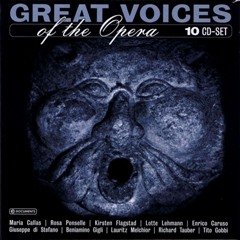Great Voices of the Opera (2011) CD5 - Enrico Caruso
Great Voices of the Opera (2011) CD5 - Enrico Caruso

5-1 –Enrico Caruso Manon: Il Sogno 2:42 5-2 –Enrico Caruso Cavalleria Rusticana: Viva Il Vino 2:34 5-3 –Enrico Caruso La Forza Del Destino: Solenne In Quest'ora 4:25 5-4 –Enrico Caruso La Bohème: Che Gelida Manina 4:11 5-5 –Enrico Caruso La Bohème: O Soave Fanciulla 3:28 5-6 –Enrico Caruso I Pagliacci: Recitar ... Vesti la Giubba 3:16 5-7 –Enrico Caruso L'Africana: Mi Batti Il Cor ... O Pradiso 3:43 5-8 –Enrico Caruso Rigoletto: Questa O Quella 2:08 5-9 –Enrico Caruso Rigoletto: La Donna è Mobile 2:23 5-10 –Enrico Caruso Rigoletto: Bella Figlia Dell' Amore 4:06 5-11 –Enrico Caruso La Bohème: Addio Dolce Svegliare 3:40 5-12 –Enrico Caruso Don Sebastiano: Deserto In Terra Sol 4:26 5-13 –Enrico Caruso Tosca: Recondita Armonia 2:31 5-14 –Enrico Caruso Tosca: E Lucevan Le Stelle 3:06 5-15 –Enrico Caruso La Forza Del Destino: Della Natal Sua Terra 4:14 5-16 –Enrico Caruso Les Huguenots: Bianca Al Par 4:11 5-17 –Enrico Caruso Carmen: La Fleur Que Tu M'avais Jetée 3:51 5-18 –Enrico Caruso Aida: La Fatal Patria ... O Terra Addio 8:28
The most famous operatic tenor of all time, Enrico Caruso (né Errico Caruso) was born on February 25, 1873 (not on February 27, as given in many reference books). He was the third child of his relatively poor parents -- not the 18th, as is often repeated in popular myth. He began serious vocal studies with Guglielmo Vergine in 1891 and later studied with Vincenzo Lombardi. In 1895, he made his debut in L'amico Francesco by Domenico Morelli. That fall in Cairo, he sang Cavalleria rusticana, La Traviata, Lucia di Lammermoor, La Gioconda, and Manon Lescaut, all in less than four weeks.
His international fame began when he sang Loris in the premiere of Giordano's Fedora in 1898. In the following seasons, he sang at St. Petersburg, Moscow, Buenos Aires, Milan, Monte Carlo, and London. Arturo Toscanini conducted his Teatro alla Scala debut when he sang Rodolfo in La bohème. Nellie Melba was his partner at his London debut in Rigoletto.
After making his very successful debut at the Metropolitan Opera as the Duke in Rigoletto, Caruso made the United States his primary operatic home. He spent the major part of each year singing there and usually had the honor of singing opening nights. He also took part in the annual Metropolitan Opera tour of the U.S., and in 1906 was caught in the great San Francisco earthquake right after his performance in Carmen. It was at the Metropolitan Opera that he sang the premiere of Puccini's La fanciulla del West.
As he aged, Caruso began to take on heavier roles including Samson, Eleazar in La Juive, and Vasco in L'africaine. After the tour each season, Caruso would travel to South America and/or Europe to sing and vacation. He never sang in his native city of Naples after 1902 because of a particularly nasty reception to his performances of Massenet's Manon. In 1920, he underwent several operations for pleurisy, but his health continued to decline afterwards. He returned to his native Naples, where he died in 1921.
Caruso's voice had a warmth, and an almost baritonal quality, which was different from the bright, ringing sound favored by most of the colleagues. The voice was extremely beautiful and he had an excellent feeling for the shape of a phrase. His sound recorded very well which helped to make his recordings among the most popular of his time; many of these selections have been available in one format or another since they were first issued. He was for many years the best selling classical performer in America.
Known as a generous colleague as well a great practical joker on stage, Caruso was welcome everywhere. He was a firm believer in good food, good wine, and a good cigar. However, whenever a friend was in a difficult situation, he was the first to offer help. One evening in Philadelphia when a colleague playing Colline became hoarse during a performance of La bohème, Caruso sang the bass aria for him to save the performance. During World War I, he sang in many benefit concerts to raise money for the war effort. To this day Caruso is imprinted in the imagination as the archetypal operatic tenor. ---Richard LeSueur, allmusic.com
download (mp3 @320 kbs):
yandex mediafire uloz.to cloud.mail.ru gett








